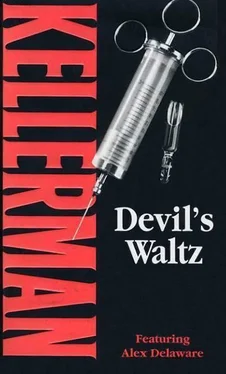He nodded with passion. “Gang rape, Doctor. It’s happening all over the country. There are over nine hundred thousand corporate pension funds in the U.S. Two trillion dollars held in trust for eighty million workers. When this last bull market created billions of dollars of surplus, corporations got Congress to ease up on how surpluses can be used. The money’s now considered a company asset , rather than the property of the workers. Last year alone, the sixty largest corporations in the U.S. had sixty billion dollars to play around with. Some companies have started buying insurance policies so they can use the principal. It’s part of what fueled the whole takeover mania — pension status is one of the first things raiders look at when they choose their targets. They dissolve the company, use the surplus to buy the next company, and dissolve it. And so on and so on. People get thrown out of jobs — too bad.”
“Getting rich with other people’s money.”
“Without having to create any goods or services. Plus, once you start thinking you own something, it gets easier to bend the rules. Illegal pension manipulations have skyrocketed — embezzlement, taking personal loans out of the fund, awarding management contracts to cronies and taking kickbacks while the cronies charge outrageous management fees — that’s organized crime’s contribution. Up in Alaska we had a situation where the mob cleaned out a union fund and workers lost every cent. Companies have also changed the rules in the middle of the game by switching over to defined-contribution plans. Instead of monthly payments the retiree gets one lump sum based on his life expectancy, and the company buys itself predictability. It’s legal, for the time being, but it defeats the whole purpose of pensions — old-age security for working people. Your average blue-collar guy doesn’t have any idea how to invest. Only five percent ever do. Most defined-benefit payouts get frittered away on miscellaneous expenses, and the worker’s left high and dry.”
“Surpluses,” I said. “Bull markets. What happens when the economy slows, like right now?”
“If the company goes belly-up and the plan’s been looted, the workers have to collect from any private insurance companies that hold paper. There’s also a federal fund — PBGC. Pension Benefits Guarantee Corporation. But just like FDIC and FSLIC, it’s grossly underfunded. If enough companies with looted plans start folding, you’ll have a crisis that’ll make the S and L thing look like a picnic. But even with PBGC functioning, it can take years for a worker to collect on a claim. The employees with the most to lose are the oldest and sickest — the loyal ones who gave their lives to the company. People go on welfare, waiting. Die.”
His whole face had gone red and his hands were big mottled fists.
“Is the doctors’ fund in jeopardy?” I said.
“Not yet. As Mr. Cestare told you, Jones saw Black Monday coming and turned mega-profits. The hospital board of directors loves him.”
“Building up his cashbox, for future plundering?”
“No, he’s plundering right now. As he’s putting dollars in, he’s slipping them out.”
“How can he get away with it?”
“He’s the only one who’s got a handle on each and every transaction — the total picture. He’s also using the fund as leverage for personal purchases. Parking stock in it, merging fund accounts with his own — moving money around hourly. Playing with it. He buys and sells under scores of aliases that change daily. Hundreds of transactions daily.”
“Lots of commission for him?”
“Lots. Plus, it makes it incredibly difficult to keep track of him.”
“But you have.”
He nodded, still flushed — the hunter’s glow. “It’s taken me four and a half years but I’ve finally gained access to his data banks, and so far, he doesn’t know it. There’s no reason for him to suspect he’s being watched, because normally the government doesn’t pay any attention to nonprofit pension funds. If he hadn’t made some mistakes with some of the corporations he killed, he’d be home free, in fiduciary heaven.”
“What kinds of mistakes?”
“Not important,” Huenengarth barked.
I stared at him.
He forced himself to smile and held out one hand. “The point is, his shell’s finally cracked and I’m prying it open — getting exquisitely close to shattering it. It’s a crucial moment, Doctor. That’s why I get cranky when people start following me. Understand? Now, are you satisfied?”
“Not really.”
He stiffened. “What’s your problem?”
“A couple of murders, for starts. Why did Laurence Ashmore and Dawn Herbert die?”
“Ashmore,” he said, shaking his head. “Ashmore was a weird bird. A doctor who actually understood economics and had the technical skills to put his knowledge to use. He got rich, and like most rich people he started to believe he was smarter than anyone else. So smart he didn’t have to pay his share of taxes. He got away with it for a while, but the IRS finally caught on. He could’ve gone to jail for a long time. So I helped him.”
“Go west, young swindler,” I said. “He was your hacker into Jones’s data, wasn’t he? The perfect wedge — an M.D. who doesn’t see patients. Was his degree real?”
“Hundred percent.”
“You bought him a job with a million-dollar grant, plus overhead. Basically, the hospital got paid to hire him.”
He gave a satisfied smile. “Greed. Works every time.”
“You’re IRS?” I said.
Still smiling, he shook his head. “Very occasionally, one tentacle strokes the other.”
“What’d you do? Just put your order in to the IRS? Give me a physician in tax trouble who also has computer skills — and they filled it?”
“It wasn’t that simple. Finding someone like Ashmore took a long time. And finding him was one of the factors that helped convince... my superiors to fund my project.”
“Your superiors,” I said. “The Ferris Dixon Institute for Chemical Research — FDIC. What does the R stand for?”
“Rip-off. It was Ashmore’s idea of a joke — everything was a game with him. What he really wanted was something that conformed to PBGC — the Paul Bowles Garden Club was his favorite. He prided himself on being literary. But I convinced him to be subtle.”
“Who’s Professor Walter William Zimberg? Your boss? Another hacker?”
“No one,” he said. “Literally.”
“He doesn’t exist?”
“Not in any real sense.”
“Munchausen man,” Milo muttered.
Huenengarth shot him a sharp look.
I said, “He’s got an office at the University of Maryland. I spoke to his secretary.”
He lifted his cup, took a long time drinking.
I said, “Why was it so important for Ashmore to work out of the hospital?”
“Because that’s where Jones’s main terminal is. I wanted him to have direct access to Jones’s hardware and software.”
“Jones is using the hospital as a business center? He told me he doesn’t have an office there.”
“Technically that’s true. You won’t see his name on any door. But his apparatus is buried within some of the space he’s taken away from the doctors.”
“Down in the sub-basement?”
“Let’s just say buried deeply. Somewhere hard to find. As head of Security, I made sure of that.”
“Getting yourself in must have been quite a challenge.”
No answer.
“You still haven’t answered me,” I said. “Why’d Ashmore die?”
“I don’t know. Yet.”
“What’d he do?” I said. “Make an end-run around you? Use what he’d learned working for you to extort money from Chuck Jones?”
Читать дальше












